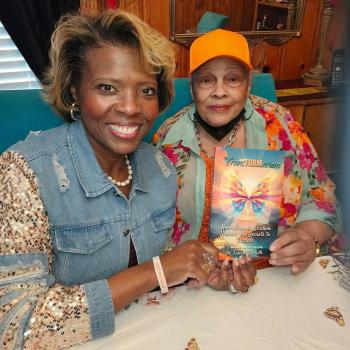By Nick Street

If your religious life involves sitting in a pew -- virtual or actual -- and chanting hymns and creeds from a book approved by a synod or council, odds are you're practicing what Sidian Morning Star Jones calls "proprietary religion."
"It's anything with a tangible sense of authority," Jones says. "If it involves a pope or a priest or even a god handing knowledge down to the public in a hierarchical way, that's what we mean by Religion 1.0. Open source religion -- what we mean by Religion 2.0 -- is of course a horizontal model."
Jones, a 26-year-old graphic designer and self-taught electronic media religionist, is the creative force behind RedefineGod.com and the upcoming MyMythos.org, websites that are tailor-made for the rapidly growing cohort of spiritual-but-not-religious seekers known collectively as the "Nones."
"People change," Jones says. "Now they define and redefine their belief systems throughout their lifetimes. Someone believes in karma, but also believes in an afterlife and considers himself a follower of the teachings of Jesus, even if he doesn't call himself a Christian. The demographic that considers themselves not a part of any particular religion are the people who are going to be relating to what we're doing."
The centerpiece of the "horizontal model" that Jones sees as the distinguishing feature of Religion 2.0 is a set of ongoing, interactive visitor forums around conceptually dense topics like quantum entanglement and memetics. From these forums Jones plans to distill the collective wisdom of the site's online community into a "kernel" that will then provide the raw material for a continuously evolving system of belief -- the "source code" for Religion 2.0.
That radically democratic approach to religious authority might seem like a no-brainer for sciencey spiritual seekers with a professed aversion to rites and costumes. But Jones says the age-old human impulse to find something -- or someone -- to submit to or rebel against is abundantly apparent at RedfineGod.
"I have to be careful," he says. "People who may oppose my position on a topic think they're somehow being heretical. Others get too attached to my position just because it's mine. That's just not what we're about."
How deep-rooted human traits and practices get projected into online religious communities is one of the main subjects of interest for Heidi Campbell, an assistant professor of communication at Texas A&M and author of the forthcoming book, When Religion Meets New Media.
"People have said that the Internet is transforming all kinds of authority -- especially religious authority," Campbell says. "But what is being transformed? The basic structures of belief, leadership roles, theology, texts? First you have to look at religious authority offline. More often than not, shifts that we're seeing online are really just reflections or amplifications of what's happening offline."
Still, Campbell notes that while the Jewish, Christian and Muslim groups that she studies had already started to become less defined by geographic location and more seeker-oriented well before they ventured online, in many instances a particular group's Web presence has in turn shaped its offline culture.
"When they got online and developed certain patterns of communication," she says, "they began to model the offline community to resemble online community."
And although she says that the Internet is currently "a supplement, not a substitute, for religion offline," she's also willing to allow that experiments in true "online religion" like RedefineGod may succeed with the next generation of seekers.
"Give it a decade or so," Campbell says. "The students I have now have a very different relationship to technology. Connectivity has a different meaning for them -- they see it as a right and not just a privilege."
That's enough of an opening for Sidian Jones, who declares his intention "to be the Steve Jobs of new religion" in a follow-up note after his interview. He may succeed -- by pairing the tenet-generating functionality of RedefineGod with the experiential components he envisions for MyMythos, Jones has intuitively reproduced the dance between "religious genius" and "regulative practice" that William James found at the heart of all religions.
Or he may not. The new generation of technologically integrated "Nones" are forging meaning, identity and community -- the raw materials for any spiritual movement -- in ways and in places that are often otherwise unrecognizable as sites of religious activity.




